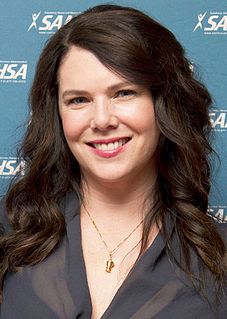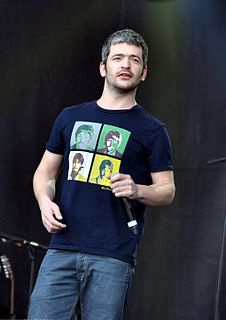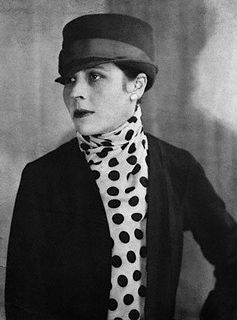A Quote by Lauren Graham
Over and over in the play my character says, "I'm thirty-two years old," as if that should explain everything that's wrong in her life. I don't know what it's like to be thirty-two, but I can imagine. I imagine she means she's stuck in an in-between time, she's at an age that isn't a milestone but more of a no-man's-land, an age where she's feeling like her hopes are fading.
Related Quotes
She didn't feel thirty. But then again again, what was being thirty supposed to feel like? When she was younger, thirty seemed so far away, she thought that a woman of that age would be so wise and knowledgeable, so settled in her life with a husband and children and a career. She had none of those things. She still felt as clueless as she had felt when she was twenty, only with a few more gray hairs and crow's feet around her eyes.
[My mother] was the oldest of two sisters and two brothers, and she grew up with her brothers, who were about her age. She grew up, to the age of ten, like a wild colt, and then all of a sudden that was over. They had forced on her her 'woman's destiny' by saying, 'This isn't done, this isn't good, this isn't worthy of a lady.'
My mother’s been living alone for over ten years. She gets up at six every morning. She makes herself a coffee. She waters her plants. She listens to the news on the radio. She drinks her coffee. She has a quick wash. An hour later, at seven, her day is over. Two months ago a neighbour told her about your blog, and she asked me to buy her one of those thingummyjigs – by a thingummyjig she meant a computer. And since then, thanks to your trimmings, your ribbon bows, your tie-backs for curtains, she’s rediscovered the joys of life. So don’t tell me you don’t know any answers.
All children, except one, grow up. They soon know that they will grow up, and the way Wendy knew was this. One day when she was two years old she was playing in a garden, and she plucked another flower and ran with it to her mother. I suppose she must have looked rather delightful, for Mrs Darling put her hand to her heart and cried, ‘Oh, why can’t you remain like this for ever!’ This was all that passed between them on the subject, but henceforth Wendy knew that she must grow up. You always know after you are two. Two is the beginning of the end.
She laughs and looks out the window and I think for a minute that she's going to start to cry. I'm standing by the door and I look over at the Elvis Costello poster, at his eyes, watching her, watching us, and I try to get her away from it, so I tell her to come over here, sit down, and she thinks I want to hug her or something and she comes over to me and puts her arms around my back and says something like 'I think we've all lost some sort of feeling.
One thing I did have under my belt was, my mother lost her mother when she was 11. She mourned her mother her whole life and made my grandmother seem present even though I never met her. I couldn't imagine how my mom could go on but she did, she took care of us, she worked two jobs and had four children. She was such a good example of how to conduct oneself in a time of grief. When I lost my husband, I tried to model myself as much as I could on her.
Yet losing him seemed unbearable. He was the one she loved, the one she would always love, and as he leaned in to kiss her, she gave herself over to him. While he held her close, she ran her hands over his shoulders and back, feeling the strength in his arms. She knew he’d wanted more in their relationship than she’d been willing to offer, but here and now, she suddenly knew she had no other choice. There was only this moment, and it was theirs.
She had had her momentary flowering, a year, perhaps, of wildrose beauty, and then she had suddenly swollen like a fertilized fruit and grown hard and red and coarse, and then her life had been laundering, scrubbing, laundering, first for children, then for grandchildren, over thirty years. At the end of it she was still singing.
She was nervous about the future; it made her indelicate. She was one of the most unimportantly wicked women of her time --because she could not let her time alone, and yet could never be a part of it. She wanted to be the reason for everything and so was the cause of nothing. She had the fluency of tongue and action meted out by divine providence to those who cannot think for themselves. She was the master of the over-sweet phrase, the over-tight embrace.
Mother Teresa was a hero of mine for a long time. I just like the way she took on the world from a very humble place. She has a great quote. When she was leaving her monestary to start Sisters of Charity, she had two pennies. She was asked by a head priest what she could possibly do with two pennies. She said, 'Nothing. But with two pennies and God, I can do anything'.
When he held her that way, she felt so happy that it disturbed her. After he left, it would take her hours to fall asleep, and then when she woke up she would feel another onrush of agitated happiness, which was a lot like panic. She wished she could grab the happiness and mash it into a ball and hoard it and gloat over it, but she couldn't. It just ran around all over the place, disrupting everything.
Celia [Brady] is a young woman who, you know, she's still got that fresh young vibe about her but at the same time she's quite wise beyond her years and very mature and she has that womanly, sexy quality, but at the same time she's very youthful in her clothes. She has that interesting mix between the two. I really love that balance about fashion.
For hours she danced and sang and flirted and did this thing that's-she did Marilyn Monroe. And then there was the inevitable drop. And when the night was over and the white wine was over and the dancing was over, she sat in the corner like a child, with everything gone. I saw her sitting quietly without expression on her face, and I walked towards her but I wouldn't photograph her without her knowledge of it. And as I came with the camera, I saw that she was not saying no.




































